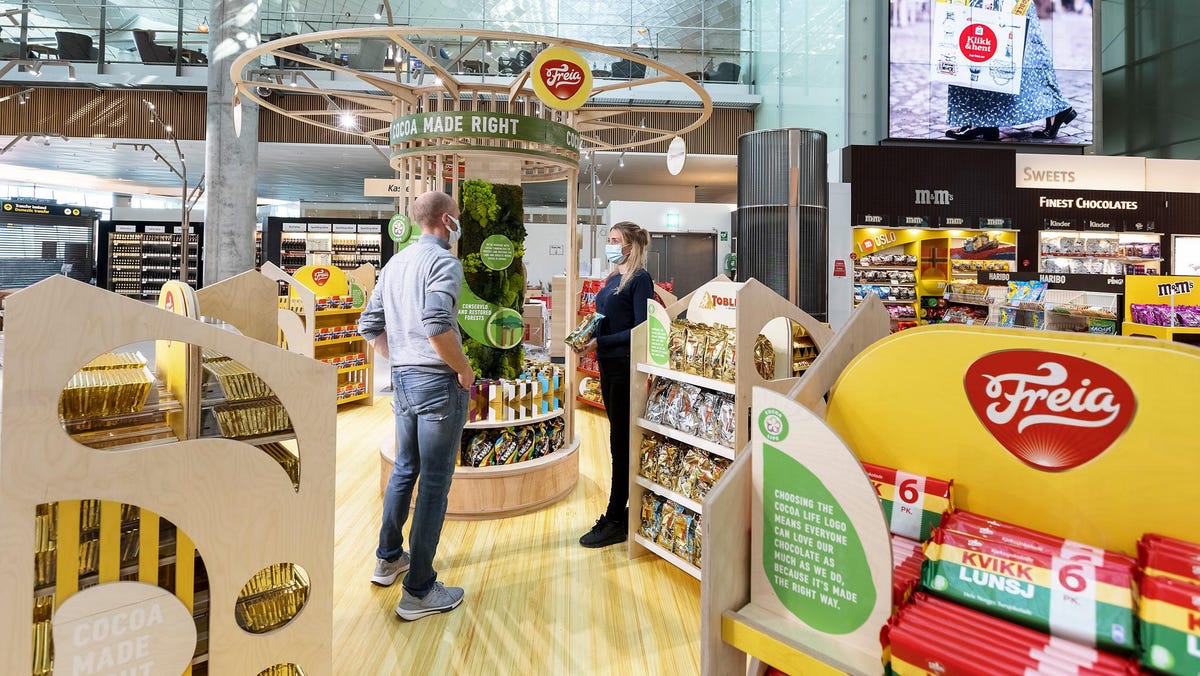
This is the first time Mondelez has featured a “zero waste” retail design in travel retail.
Mondelez has put sustainable cocoa in the spotlight in the travel-retail channel using an activation at Oslo Airport in partnership with Travel Retail Norway, in which duty-free company Heinemann has joint ownership.
Called Cocoa Life, the multi-brand promotion—developed by the World Travel Retail division of the confectionery giant—is also the first to features a “zero waste” retail design. It uses displays of natural wood made entirely of wood off-cuts from other units, with living plants “woven in” to emphasize the sustainability story.
The Oreo brand owner, with a turnover of $26 billion in 2019, is not featuring the U.S. bestselling cookie as part of the activation, focusing instead on popular Nordic chocolate brands like Daim, Freia and ubiquitous triangular airport favorite Toblerone.
The Cocoa Life program tackles the causes of what Mondelez International describes as “complex challenges” that cocoa farmers and their communities face, including climate change, gender inequality, poverty and child labor. The travel retail division claims that 99% of its chocolate portfolio now uses cocoa that is sustainably sourced through the program, with the ambition of achieving 100% by 2025.
Iris Litschauer, senior business development manager at Mondelez WTR, said in a statement: “Using sustainable solutions for cocoa production benefits farming communities and the environment. We’re proud to debut the concept with Gebr. Heinemann and Travel Retail Norway.”
MORE FOR YOU
Duty bound
At Travel Retail Norway, category manager Frank Hansen pointed out that sustainability continues to grow in importance in the Nordics, where confectionery is also heavily consumed. “The travel retail industry has a duty to both our consumers and the planet to offer products with ingredients that are sustainably sourced as well as to reduce our environmental footprint wherever possible,” he said. “Hopefully this activation will inspire more sustainable practices in the channel.”
Th ubiquitous Toblerone gets the green treatment.
Jens Peter Peuckert, marketing director at Gebr. Heinemann, added: “We believe that sustainable products and services will be the drivers of economic growth in travel retail. This activation in Oslo engages travelers at the intersection between sustainable design and products with sustainably-sourced ingredients. It is a perfect example of how people, planet and profit go hand in hand.”
“Role-model function”
On Tuesday, Heinemann also outlined wider development goals by issuing its third UN Global Compact (UNGC) progress report. The UNGC primarily deals with corporate governance and principles based on human rights, labour standards, the environment and corruption prevention.
Max Heinemann: “We are aware of our influence and our responsibility as a company, and therefore … [+]
“We see our UNGC reporting as an opportunity to regularly review, document and optimize the social and ecological consequences and interactions of our economic activities,” said Heinemann CEO Max Heinemann, who represents the fifth generation of owners. “We are aware of our influence and our responsibility as a company, and therefore also of our role-model function.”
In the reporting period from August 2020 to August 2021 some of the achievements/actions were as follows:
- Human rights risk assessment of the Norway range of 64,000 products showed less than 1% had to be classified as critical
- Green energy for two logistics centers and the company’s Hamburg headquarters led to “significantly reduced” CO2 emissions at the three locations
- Environmental and human rights have become an integral part of communications between Heinemann and its suppliers, enshrined in a code of ethics set out in June 2021.
Max Heinemann commented: “We derive our focus topics from the areas where we have the strongest impact and thus the strongest leverage with our business model. To implement them, we will cooperate with all partners in our value chain.”
As such the company will be working towards wider goals by 2030 including the generation of more than half of sales through sustainable products and with responsible suppliers; being carbon-neutral primarily through reduced energy consumption; and implementing waste reduction, circular economy, and recycling measures in all parts of the value chain.
The upshot is that the company has defined a clear path forward on sustainability that will impact its partners. An example is the Tony’s chocolate brand opening at Amsterdam’s Schiphol Airport where Heinemann had a key role. In taking this lead, brands and suppliers will need to adapt their practices to keep pace with the retailer. Expect, therefore, to see more ethical and/or sustainable promotions like the one in Oslo popping up across European airports in the first instance, and then further afield.







